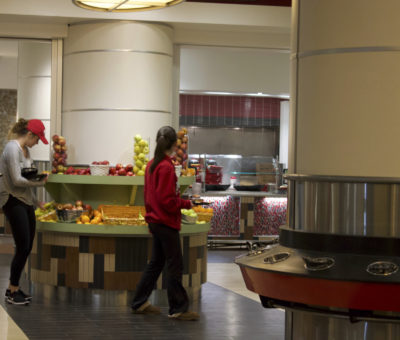
Unusually cold weather conditions, in conjunction with other external factors, are affecting banana plantations worldwide, causing a shortage of bananas in Boston University dining halls.
Valentina Jimenez, a Chiquita Banana social media specialist, wrote in an email that the unfavorable climatic conditions are slowing banana growth, production, and yields throughout the Americas, and making the transportation of the bananas increasingly difficult.
Below-average temperatures in banana-growing nations like Guatemala, Honduras and Mexico have hindered the countries’ ability to grow the internationally exported fruit. In Costa Rica and Panama, the excessive rainfall and the flooding that have plagued the country in recent weeks have damaged plantations and infrastructure like roads and bridges. At the same time, high-velocity winds and above-normal water levels have resulted in unprecedented shipping delays.
Claire Sanfuentes, a freshman in the College of Communication, said she noticed the shortage on Wednesday when she opted for a healthy dessert after lunch at Marciano Commons, only to find an absence of bananas.
“I always get bananas to be healthier, but there were no bananas, and I was appalled by the situation,” Sanfuentes said. “[I will have to] lean more to brownies and cookies, and also the sweet and filling part of my meal [is] no longer present.”
Vessel loading of bananas has been delayed in Mexico, Costa Rica and Guatemala due to the inclement weather, according to U.S. Foods’ Farmer’s Report from Feb. 2. Avocados and green onion supplies were also reported to be limited due to weather conditions.
“[Banana] quality remains OK, with some minor issues being reported sporadically,” according to the report.
Jamie Postell, Chiquita Banana’s director of sales for North America, wrote in a press release that the supply chain has been impacted for the last few weeks. He wrote that Chiquita will ship fruit from different ports as transport becomes available.
“National instability and supply interruptions in Honduras come at a time when industry supply is seasonally tight,” Postell wrote. “We are doing everything possible to minimize the impact to [banana consumers].”
BU Dining Services Marketing Director Scott Rosario said BU Dining Services’ two largest banana suppliers, Chiquita Banana and Del Monte, have indicated that they expect the shortage to last for another month.
“It could be another three to six weeks — about a month or so — that we’ll be seeing shortages in bananas, and the bananas might not be as yellow as we’re used to seeing and might be a little less ripe,” Rosario said.
Maxim Sapozhkov, a freshman in the Questrom School of Business, said that as an athlete, bananas are an important source of potassium in his diet and that the ongoing shortage could reduce his access to these kinds of nutrients.
“I eat them a lot for nutritional purposes and it’s a great snack on the go and in high demand, especially in Warren,” Sapozhkov said. “When I come back from athletics and I don’t want to eat heavy food, I just want a small snack. It’s sad if there aren’t any.”
Sapozhkov said he thinks students should be willing to turn to alternative fruits in the meantime.
“I think [BU Dining Services] are doing the best they can, providing the most,” he said. “Warren has a wide variety of selection of fruits. Picking another fruit is fine.”
McKenna Coyle, a student manager in the Warren Towers dining hall, said she is concerned that the banana shortage will impact students who visit the Late Nite Cafe. She said she has heard complaints about a lack of bananas at the smoothie station.
“If we were out of bananas, people would complain because bananas are in high demand,” the College of Arts and Sciences senior said. “[Students] might not want a smoothie anymore.”
Rosario said students may have to settle for subpar bananas until the shortage is amended.
“I’m sure there’s probably students who really enjoy bananas that might not have access to their favorite ripeness level, so we are going to do our best to get those products as soon as we can,” Rosario said.
